Who needs 'Star Wars' when you've got 'The
Scar'?
The Agony Column for May 6, 2002
Commentary by Rick Kleffel
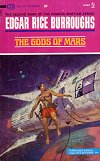
|

|
|
"I'm your father, Lucas." Someone made enough money to
found a new nation bringing the covers of old Edgar Rice
Burroughs books to life on the big screen -- but forgot what
lies between the covers.
|
Is the title of this book -- er movie -- er whatever,
devoid of irony? What generation of xerox are we talking
about? Don't look for a review of this book, or movie in
this column!
|
Cover art is a great way to sell a book. But we all know that the
best part of any book lies behind the cover. So how is it that movies
have become mere moving book covers, instead of filmed novels? All
the surface, none of the depth. It's an interesting inversion that
one can see in the covers of the Edgar Rice Burroughs novels that
clearly inspired Star Wars. Now, I'm not that conversant on
everything Lucas. But I wish more of the investment went into the
scripting.
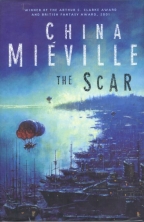
|

|
|
Now playing from your independant UK bookseller --
China Mieville's 'The
Scar' will blow you away, if you like that sort
of thing.
|
There's only a one or two month lag-time --instead of
over a year -- between the US and the UK publication dates.
Int he US, you're going to have to settle for a trade
paperback version.
|
The realized scenes in recent SFX spectaculars actually pale in
comparison to the experience of reading China Mieville's 'The
Scar'. This 604 page work of imaginative fiction has many scenes
that will leap into the reader's brain with a clarity that will
linger long after two hours of 95dB heavily panned explosions.
Fortunately, they're actually spending about 1/1,000,000th of the SW2
publicity budget promoting this novel.
Mieville isn't exactly unknown in the SF world. He's won awards,
recognition, his books are given big print runs and are readily
available at MegaSmega Bookmart. But because many of the scenes in
'The Scar' echo those found in parts of various SW movies, it's time
for readers to come out swinging. This book is excellent evidence
that the experience of reading is much more intense and memorable
than the experience of seeing a movie. A great writer can create an
intensely visual rapport with the reader. Our personal special
effects are always the best.

|

|
|
The true first edition of China Mieville's 'King Rat'
(something that only real book geeks like me actually care
about) was the UK trade paperback.
|
Tor books did the right thing to immortalize that
first novel in hardcover. Too bad they rather screwed the
pooch with the release of his follow-up.
|
Mieville has come up to speed quickly. His first novel, 'King
Rat', was released as a trade paperback in the UK in July 1999. It's
a very urban dark fantasy story, filled with ultra-hip musical
references -- Mieville's gift to the jungle music scene. Tor books
released the hardcover (the first hardcover version, for you^H^H^H us
hardcore book collector types) in October 1999. In it, Saul Garamond,
a twenty-something nothing, returns home late one night. Upon
awakening, he finds that his father has been killed and he's the
suspect. In jail, he's freed by The Rat King and plunged into the
supernatural underground of London.
While Saul and the Rat King are excellent, memorable characters,
the real star of 'King Rat' is the city of London. Mieville lavishes
and unleashes language on the city as if it were an errant lover, a
horrible bully-thug, and an undependable best friend. He builds and
destroys, invades and escapes, badgers and coerces. Nooks, crannies,
intersections, underground, dirt, filth, green grass and dark skies
are all caught in his words. He also does an admirable job of writing
about music, the jungle/drum-n-bass music of the late 90's in
particular. It's not easy to write about music without sounding
precious. Yes, I admit, I'm a bit more likely to whinge when it comes
to writers writing about music. I was working with the people who
actually programmed many of the sounds used by jungle musicians when
this novel was written, and the descriptions really capture the feel
of the music without annoying the heck out of me. For what it's
worth.
'King Rat' got lots of notice and Tor brought it out as a
hardcover. So in March of 2000, when 'Perdido Street Station'
exploded into our midst in its riot of invention in the UK hardcover,
Tor immediately took notice and brought out the US version at
virtually the same time, in a similarly lavish hardcover edition.
Oops, my bad. No, Del Rey waited nearly a year to bring out the US
version as a trade paperback. I just don't get it, I just don't get
it. 'Perdido Street Station', for the three people reading this
column who haven't read the book, is a huge, colossal fantasy set in
the world of Bas Lag, primarily in the city of New Crobuzon.
Certainly presaged by Mieville's evocation of London in 'King Rat',
New Crobuzon is still an incredible creation, borrowing from every
genre it can find and creating new ones where necessary. If you
haven't read this novel, run to your local independent bookstore and
buy their copy. They'll probably have at least one on hand, and there
won't be any of that mail order waiting. 'Perdido Street Station' is
a novel that is instant gratification personified, cast into 700 plus
pages. At least for some of us.
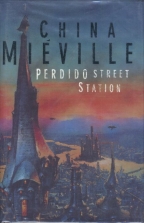
|

|
|
Steampunk, swordpunk -- fantsy or science fiction?
Literature or horror? 'Perdido Street Station' is pretty
much everything it wants to be to those who like, uh like
that sort of thing.
|
Too late but never too little, Del Rey brought out the
US version of Perdido Street Station in a trade paperback
format. Rather a nice trade paperback format, but still,
nothing you could injure somebody with.
|
'Perdido Street Station' is large enough that it won't yield to
easy summarization, and I'm not interested in that anyway. Suffice it
to say that creates an entire city from whole cloth that is like
nothing you've ever read about in a book or seen on a movie screen.
Mieville uses his language so well that readers can see through the
cracks between the words. He brings to life a huge cast of races,
creatures, cultures and ideas without apparent effort. The smart
money is that this novel owes something to Mervyn Peake's
'Gormenghast' books, which happen to be one of my favorite fantasies.
There is a linguistic similarity, but mostly Mieville is out on his
own.
What's most striking about 'Perdido Street Station' is the
author's ability to top himself again and again, to paint a scene
that lives in your brain like a great movie set-piece, well beyond
the date you finish reading the book. It's worrisome at first. You
come upon some exquisitely created bit of spectacle early on and say
to yourself "There's 590 pages left in this book and I've just read
the best scene? What the heck!" But Mieville delivers another scene,
as good or better, x pages down the line. And he keeps doing so for
710 pages. In one utterly original bit after another.
Now what's important here is that this book, and other books like
it, can easily replace the pleasures offered by big-screen SFX
spectaculars. There's just no doubt in the reader's mind that,
trapped in the pages of 'Perdido Street Station' are genuinely visual
scenes of wonder and awe. Scenes that I remember more clearly than
any SF movie. (Now I'm not against Terry Gilliam's two part
adaptation of 'Perdido Street Station, mind you. Isn't that the
plan?)
Of course, the old Usenet caution of YMMV ('Your Mileage May
Vary') applies to 'Perdido Street Station'. It is a rich stew and a
huge one. I actually gave a copy of this novel to a friend because I
was so sure that they would enjoy it -- and they never finished it.
There are extenuating circumstances, but still... If you like this
sort of thing, and if you like this novel -- you will love this
novel. It's easily re-readable.
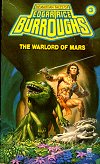
|
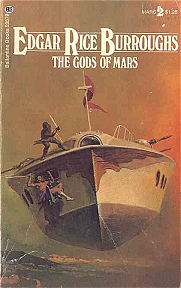
|
|
This 1981 re-issue of the The Warlord of Mars seems to
be inspired by some scenes from Star Wars.
|
This is the cover the exact edition of the Mars books
I read when I was a kid, and Lucas has brought them to life
many times over.
|
That brings us to the dueling spectaculars -- the created-by-me
Duel to the Death between Star Wars 2 and Mieville's latest novel,
'The Scar'. Tor has almost kind of learned its lesson. The UK
hardcover version of this novel is currently shipping. The Del Rey
trade paperback will be out in the US in June. They're pulling out
all the stops for this book. That is, they're going to publish it,
ship it, and see if they can get it reviewed in a few prime places.
SW2 has mega-stars, mega-budgets and SFX to die for. They've brought
the old covers of Edgar Rice Burroughs books to life. They've brought
the covers of old Frank Herbert and Isaac Asimov books to life. But
they haven't gone any deeper than the covers.
At this juncture, I think I'm supposed to say "But it's a movie,
what do you expect?" I expect that a science fiction movie could be
rather easily made that had the subtlety of say 'Chinatown', the
depth of say 'Amadeus'. It's not undoable. Look at 'Pi', a science
fiction movie where the overall budget and the screenplay budget were
more closely proportional.

|
|
Darren Aronofsky's 'Pi' was a science fiction movie
where the proportion of script costs to overall budget was
more in line to deliver a quality experience.
|
But if you look at the script costs versus overall costs of the
SFX spectaculars, you'll see what the problem is. Nobody's paying
much attention to the writing part of the movie. One can understand
that the folks in charge would want to get to the really fun stuff,
taking out the big, expensive digital toys and making them go bang.
But wouldn't it be better if they bothered to invest in the script,
so that the characters they were blowing up were people we cared
about? Or even so that the Wonder Weapons they deployed were a tad
more interesting than ten millionth version of the death ray? In the
21st century, we're still seeing the echoes of stuff that was done in
Flash Gordon.
Then there's the problems of creation by committee. Few movies get
made alone, and it is by definition currently impossible for one
person to create by themselves a special effects spectacular --
unless they're writing a book. No matter how burning the vision of
the film director, at some point they're going to have to talk to
someone else and get their input and compromise their vision against
what the available technology can do. Yes, technology has advanced
significantly in the past few years, but it's far from perfect.
Plasticky only begins to describe the current level of achievement.
But imperfect special effects aren't the problem. People are the
problem. Only one medium allows the creator to hotwire their audience
directly into the visions of their mind -- the written form. No
shortcut, no conversation, no compromise. Pure creativity can be
poured from one vessel into another.
All this brings me back to Mieville's latest. 'The Scar' has the
ultimate version of something held very near and dear to the hearts
of every SW fan out there. Mieville's just written about it. That's
all it is -- words on a page. But by the time he deploys it, his
Wonder Weapon jumps off the page and swirls around the reader in
images you'll never forget. As for cities of wonder, Mieville does
that too, and when he simply describes Salkrikraltor City it's a feat
worthy of the kind of investment it would take to generate the damn
thing using the latest CGI. And the CGI version would still be less
impressive. (But I'm willing to put up with Terry Gillliam's version
anyway.)
The bottom line is that no matter how special the effects are,
nothing that is projected before the eyes can compare to that which
is created behind them. Go ahead, jump in line and enjoy your
popcorn. But when you really want to see thrilling images of
startling wonder, to travel to exotic worlds that may never exist
without leaving your seat, turn away from the screen and towards the
printed page. When it comes to special effects, you brain has no
budgetary limitations. Even the sky is no limit.
Thanks,
Rick Kleffel










